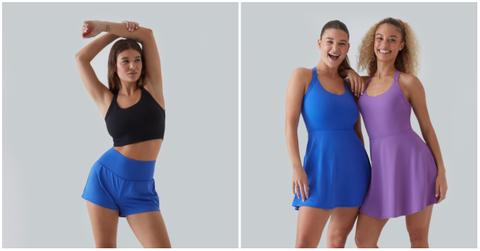Is Halara Fast Fashion? A Peek Into the Brand’s Greenwashing Practices
Halara’s low prices may be good for your wallet, but the environment is paying the price.
Published March 27 2024, 2:25 p.m. ET
In 2020, the athleisure brand Halara began showing up all over social media. It offered all the trendy pieces, flared leggings, exercise dresses, and bike shorts, but at an affordable price. Having launched amid a pandemic where many were rotting on the couch and wearing athleisure 24/7, the brand quickly took off.
But the cheap prices may be too good to be true. An inside look at Halara’s sustainability efforts and production practices reveals that the brand has a lot of work to do. Here’s why Halara is a fast fashion brand.
Is Halara fast fashion?
Halara is ultimately considered a fast fashion brand, offering inexpensive activewear using production methods and labor practices that harm both people and the environment. According to Eco Stylist, Halara started as a brand in 2020 and took off from advertising on TikTok and Instagram. Halara’s selling point was that it offered affordable activewear, which, although great for accessibility, often means the real cost is the environment.
According to Good On You, the first red flag is that Halara offers little information on its environmental impact and sustainability efforts. Despite an entire section on the website dedicated to sustainability, all the statements are vague, which screams greenwashing.
The “Environmental Footprint” section reads: “We work closely with suppliers to minimize environmental impact throughout our operations and value chain. We aim to reduce greenhouse gas (GHG) emissions in Scope 1, 2, and 3. As part of our commitment to sustainability, we added seven new suppliers in 2023 who use alternative energy sources including solar and wind power.”
Despite sounding positive, the brand has no concrete emissions goal or transparency regarding its current greenhouse gas emissions.
When it comes to product materials, most of Halara’s products are made from nylon, spandex, and cotton. According to Good On You, nylon is not biodegradable, and nylon production releases nitrous oxide, which is worse for the environment than carbon dioxide.
Spandex is also not biodegradable and releases many chemicals into the environment during production, according to One Green Planet. Lastly, according to The University of British Columbia, cotton farming can also have many environmental detriments and all-too-common labor injustices.
While Halara does have the Our Softlyzero Eco Collection, made with 79 percent recycled polyester, any other commitment to using recycled materials is vague. The brand’s website reads: “We are exploring ways to replace virgin material with recycled alternatives when possible, aiming to maximize the longevity of the materials used in our products. Some suppliers hold certifications such as Global Recycled (GRS) and the Recycled Claim Standard (RCS) from Textile Exchange.”
Without solid numbers on the brand’s current impact, and clearly defined sustainability goals, Halara’s entire sustainability section reads as greenwashing.
Is Halara ethical?
Halara’s production methods and lack of transparency in its supply chain make it an unethical brand. According to Eco Stylist, many Halara products are produced in sweatshops overseas, known for their poor working conditions and employee treatment.
The FAQ section of Halara’s website offers some product development background, which includes the statement: “As our business demand and product categories rapidly expand, we are growing our supply chain partnerships in South Asia.” According to Eco Stylist, labor laws in South Asia are known to be poorly regulated, which raises a lot of concern.

